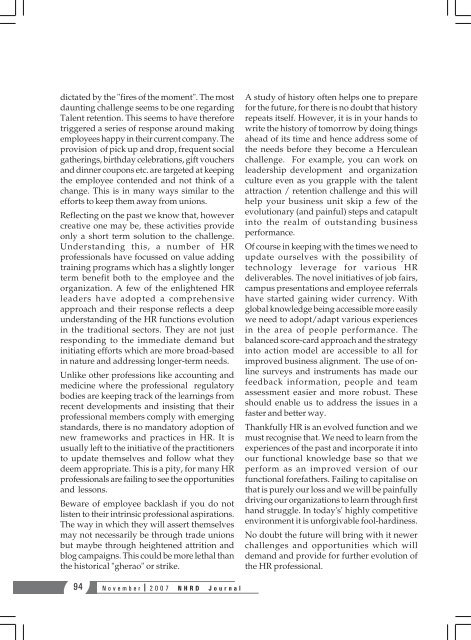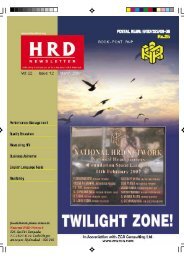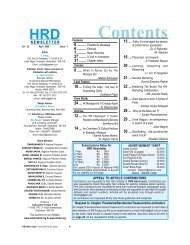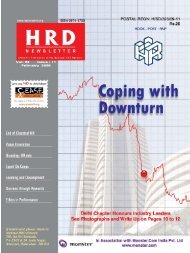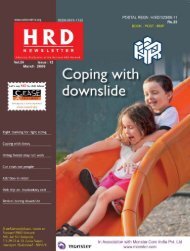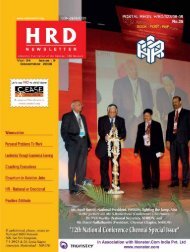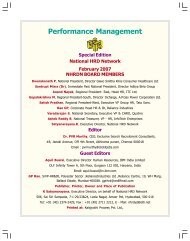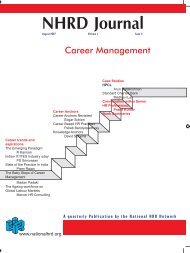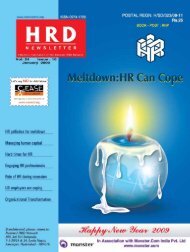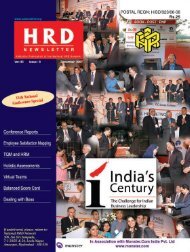NHRD Journal - National HRD Network
NHRD Journal - National HRD Network
NHRD Journal - National HRD Network
You also want an ePaper? Increase the reach of your titles
YUMPU automatically turns print PDFs into web optimized ePapers that Google loves.
dictated by the "fires of the moment". The most<br />
daunting challenge seems to be one regarding<br />
Talent retention. This seems to have therefore<br />
triggered a series of response around making<br />
employees happy in their current company. The<br />
provision of pick up and drop, frequent social<br />
gatherings, birthday celebrations, gift vouchers<br />
and dinner coupons etc. are targeted at keeping<br />
the employee contended and not think of a<br />
change. This is in many ways similar to the<br />
efforts to keep them away from unions.<br />
Reflecting on the past we know that, however<br />
creative one may be, these activities provide<br />
only a short term solution to the challenge.<br />
Understanding this, a number of HR<br />
professionals have focussed on value adding<br />
training programs which has a slightly longer<br />
term benefit both to the employee and the<br />
organization. A few of the enlightened HR<br />
leaders have adopted a comprehensive<br />
approach and their response reflects a deep<br />
understanding of the HR functions evolution<br />
in the traditional sectors. They are not just<br />
responding to the immediate demand but<br />
initiating efforts which are more broad-based<br />
in nature and addressing longer-term needs.<br />
Unlike other professions like accounting and<br />
medicine where the professional regulatory<br />
bodies are keeping track of the learnings from<br />
recent developments and insisting that their<br />
professional members comply with emerging<br />
standards, there is no mandatory adoption of<br />
new frameworks and practices in HR. It is<br />
usually left to the initiative of the practitioners<br />
to update themselves and follow what they<br />
deem appropriate. This is a pity, for many HR<br />
professionals are failing to see the opportunities<br />
and lessons.<br />
Beware of employee backlash if you do not<br />
listen to their intrinsic professional aspirations.<br />
The way in which they will assert themselves<br />
may not necessarily be through trade unions<br />
but maybe through heightened attrition and<br />
blog campaigns. This could be more lethal than<br />
the historical "gherao" or strike.<br />
A study of history often helps one to prepare<br />
for the future, for there is no doubt that history<br />
repeats itself. However, it is in your hands to<br />
write the history of tomorrow by doing things<br />
ahead of its time and hence address some of<br />
the needs before they become a Herculean<br />
challenge. For example, you can work on<br />
leadership development and organization<br />
culture even as you grapple with the talent<br />
attraction / retention challenge and this will<br />
help your business unit skip a few of the<br />
evolutionary (and painful) steps and catapult<br />
into the realm of outstanding business<br />
performance.<br />
Of course in keeping with the times we need to<br />
update ourselves with the possibility of<br />
technology leverage for various HR<br />
deliverables. The novel initiatives of job fairs,<br />
campus presentations and employee referrals<br />
have started gaining wider currency. With<br />
global knowledge being accessible more easily<br />
we need to adopt/adapt various experiences<br />
in the area of people performance. The<br />
balanced score-card approach and the strategy<br />
into action model are accessible to all for<br />
improved business alignment. The use of online<br />
surveys and instruments has made our<br />
feedback information, people and team<br />
assessment easier and more robust. These<br />
should enable us to address the issues in a<br />
faster and better way.<br />
Thankfully HR is an evolved function and we<br />
must recognise that. We need to learn from the<br />
experiences of the past and incorporate it into<br />
our functional knowledge base so that we<br />
perform as an improved version of our<br />
functional forefathers. Failing to capitalise on<br />
that is purely our loss and we will be painfully<br />
driving our organizations to learn through first<br />
hand struggle. In today's' highly competitive<br />
environment it is unforgivable fool-hardiness.<br />
No doubt the future will bring with it newer<br />
challenges and opportunities which will<br />
demand and provide for further evolution of<br />
the HR professional.<br />
94<br />
November 2007 <strong>N<strong>HRD</strong></strong> <strong>Journal</strong>


